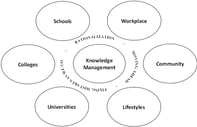Published on
Elevating Apprenticeship in Higher Education

While hospitality roles often cultivate deep, real-world expertise, traditional academic systems have long failed to recognize that value. A new approach is reshaping how institutions credit on-the-job learning, unlocking academic mobility for working learners and creating a more responsive, equitable talent pipeline for industry.
The EvoLLLution (Evo): How has the role of apprenticeships in hospitality education evolved in recent years, and why do you see them as a crucial part of career preparation today?
Nicolas Graf (NG): Apprenticeships look different around the world. In Switzerland, where I’m from, they’re common. I even did an apprenticeship myself. There, they can count toward a college degree. In the U.S., however, apprenticeships have long existed outside the higher ed system.
Organizations like the American Hotel and Lodging Association Foundation have created programs to help people advance without a degree, but those credentials are typically recognized only within the industry. Groups like CareerWise offer apprenticeships in hospitality and business, but their credentials still lack broad recognition.
We saw an opportunity to change that. In the U.S., a college degree remains the most valued credential. So, we launched an associate degree in hospitality management that includes up to 30 credits from on-the-job learning. We’re in the process of partnering with the AHLA Foundation to align their apprenticeship program with our degree, starting by awarding 18 credits to those who complete it. It’s a smart way to give academic weight to real-world experience.
Evo: What are the biggest challenges institutions are facing when implementing and scaling these apprenticeship programs, and how can they start tackling and addressing those challenges?
NG: One major challenge for companies is ensuring supervisors are equipped to mentor apprentices and document their learning. Many supervisors aren’t trained to be mentors, and companies may not invest in that kind of development. High turnover, especially in service industries, makes it even harder. Apprenticeships often last a few years, and consistent supervision throughout is critical.
On the higher ed side, awarding credit for prior learning can be complex and time-consuming, especially if the apprenticeship program isn’t standardized. If someone comes to NYU with ten years of hotel experience, we’d have to match their experience to specific course outcomes, ask them to build a portfolio of evidence, then have faculty review it. That’s not scalable. What makes our partnership with AHLA so exciting is that they’ve built a standardized apprenticeship with clear competencies. That allows us to automate credit transfer and make this model sustainable.
Evo: What role do these apprenticeships play when it comes to engaging students and student retention?
NG: Student retention comes down to three key things. First, the quality of the program. Courses—whether online or in person—need to meet students where they are. If someone’s a working professional, they likely can’t sit for hours at a screen. So, we design content that’s digestible, like short videos followed by quick quizzes. It’s about matching instruction to the learner’s life—whether they’re 30 with a full-time job or 20 with one year of experience.
The second is affordability. Many students drop out simply because they can’t afford to continue. We’ve designed this program in partnership with our NYU School of Professional Studies Division of Applied Undergraduate Studies, which offers discounted tuition. Most of our students also haven’t used their full financial aid eligibility, so we’ll help them access that, plus scholarships available through companies and foundations. Finally, strong employer partnerships matter. If businesses see value in the program and support flexibility for apprentices, they’ll build a talent pipeline and keep their employees longer. That alignment helps everyone.
Evo: What key metrics should institutions and industry partners use to measure effectiveness and the impact of these programs?
NG: The first is enrollment. The AHLA Foundation’s apprenticeship program has around 2,200 students, which is solid, but considering the size of the U.S. hospitality industry, there’s room to grow. By partnering with us, they can tell apprentices that completing the program could lead to an associate degree from NYU—a high-value credential. We’re also working with the National Academy Foundation, which has over 16,000 high school students in hospitality and tourism. That’s a powerful pipeline we want to tap into.
Retention and graduation rates are the next big metrics. We’re focused on delivering quality instruction, advising and support to ensure students succeed. Finally, career outcomes matter. We’ll be tracking where students are three years post-program—whether they’ve advanced in their careers, stayed in the industry and whether employers have seen improved retention. We’ll also look at student satisfaction, program feedback and net promoter scores, but those first three—enrollment, retention and career trajectory—are the core.
Evo: How do you envision the next five years of workforce development in hospitality education?
NG: I believe the model we’ve created—focused on earning skills on the job and connecting them to academic credentials—is the future of hospitality education. It opens doors for everyone, regardless of background, without requiring a bachelor’s or MBA. It’s accessible, inclusive and practical.
The next step is outreach, partnering with high schools, teachers and even parents to show that hospitality offers real, well-paying career paths. We’ll need to tell success stories and bring alumni back to share their journeys. Events like our recent Black History Month celebration, where leaders like Chip Wade and Marcus Samuelsson spoke, help shift perceptions. Over the next five years, it’s all about changing the narrative and showing the value and opportunity this industry truly holds.



